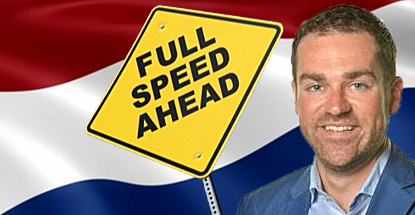 The Netherlands’ progress toward a regulated online gambling market will not be waylaid by the absence of the chief architect of the country’s Remote Gaming Bill.
The Netherlands’ progress toward a regulated online gambling market will not be waylaid by the absence of the chief architect of the country’s Remote Gaming Bill.
Former State Secretary for Security and Justice Fred Teeven resigned last month following a scandal over payments to a convicted drug dealer. But Teeven’s replacement Klaas Dijkhoff (pictured) says it’s full speed ahead for the online gambling legislation and the licensing of “reliable and suitable” operators.
Since assuming his new post last month, Dijkhoff has written a letter to the House of Representatives emphasizing his support for the Remote Gaming Bill, which seeks to modernize the country’s outdated gambling laws.
Last June, the Kansspelautoriteit (Dutch Gaming Authority or KSA) warned online operators to cease their marketing activities ahead of the 2014 FIFA World Cup. Some operators complied, while the KSA said others “jumped into the proverbial hole” created by the compliant operators’ absence.
Dijkhoff said there would be no blanket ban on operators that had served Dutch punters prior to the official regulated market opening. Dijkhoff said there was no indication that any one or two operators had achieved market dominance and thus there was no justification for “a difference in treatment between the current license holders and new market entrants.”
That said, the KSA has stated that any operator deemed to be ignoring its wishes to cease their Dutch marketing ahead of the new regime would be ineligible for a Dutch license. The KSA says it has already received over 200 expressions of interest in obtaining new Dutch online licenses, despite the fact that the relevant legislation may not receive parliament’s official stamp of approval until next year.
Last week, the KSA released its 2014 annual report, which estimated there were around 1m Dutch punters currently gambling online, spending anywhere from €250m to €800m annually. The KSA has been quite aggressive in levelling six-figure fines against operators it deems to be acting illegally but Dijkhoff said the existing prohibition on internationally licensed online gambling sites serving Dutch punters was “in reality not possible” due to the internet’s “cross-border nature.” The new bill would provide the KSA with enhanced enforcement powers to help separate the wheat from the chaff.
